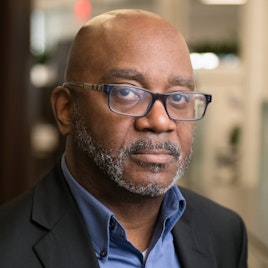Time to Get Serious About Criminal Justice Reform
By Leonard Noisette

Ending mass incarceration is suddenly the hottest topic on the presidential campaign trail. Hillary Clinton, the presumptive Democratic nominee for 2016, made it the centerpiece of her first major policy address since officially declaring her candidacy in a speech Wednesday at Columbia University in New York City. “We don’t want to create another incarceration generation,” Clinton said, urging a reduction in sentences for low-level and nonviolent offenders. She also called for widespread adoption of body cameras by police departments, and decried racial disparities in arrests and sentencing. And she reflected on the death of Freddie Gray in police custody in Baltimore, and the protests and attacks on officers that followed, referring to it as a situation that “tears at your soul.”
Clinton’s speech followed a front-page story in the New York Times noting an unusual consensus among Democrats and Republicans in the 2016 presidential race on the need for criminal justice reform. New alliances are being formed between such politically disparate groups as the Center for American Progress and the Koch Brothers. Indeed, these issues are fostering a spirit of bipartisan cooperation seldom seen in our ideologically polarized politics of late.
This is a welcome development for advocates who have been seeking for years to roll back the regimen of harsh mandatory minimums and over-incarceration dating back to Bill Clinton’s days in the White House—perhaps the last time we had “unprecedented” bipartisan support for justice policy reform. Then as now, it’s wise to be wary of politicians jumping on bandwagons. Not all of these candidates may mean the same thing when they speak broadly of criminal justice reform—or even more specifically about mass incarceration and how to wind it down. While these subjects are front and center, it would be helpful to probe more deeply, at the beginning of a necessary, but insufficient, national debate. A few questions we would respectfully ask all the candidates to consider:
- Do you support meaningful reform of harsh mandatory minimum sentences, such as the Smart Sentencing Act of 2014, which would cut in half most mandatory sentences for drug offenses, resulting in a resentencing for an estimated 8,000 drug offenders? Is it time to abolish mandatory minimums altogether, and leave sentencing up to judges’ discretion?
- It’s easy to talk about restoring trust between police and the communities they are sworn to protect. But how would you accomplish that goal? Body cameras alone will not do the trick. Should the federal government more aggressively condition financial support for local law enforcement on the implementation of reforms that would achieve a measurable decrease in unnecessary confrontations between police and community members? Should reducing racial disparities in such interactions be made a more explicit condition for support?
- Are you prepared to truly treat drug use as a public health issue—that is, not just reduce penalties or offer alternatives to incarceration, but change laws so that these matters are removed from the justice system entirely and addressed instead in community health and treatment programs?
- Research shows that it is not just people accused of low-level offenses whose sentences are overly punitive and have no meaningful impact on public safety. Would you contemplate reducing sentences for more serious offenses as well, and truly rethink this society’s notions of crime and punishment?
The Open Society Foundations work to end mass incarceration; make police departments more accountable to the communities they serve; challenge the death penalty; and replace youth justice policies that stigmatize and suppress with those that safeguard the rights of children. Our Drug Policy Project promotes policies that address drug use—and the health, mental health, and social needs it creates—within the context of communities rather than the justice system, and works to ensure access to comprehensive treatment. We welcome a deeper discussion of these issues in the context of the presidential campaign. Hillary Clinton’s speech represents a promising start. But without action, without delving deeper into the many inequities plaguing our criminal justice system today, a good speech is just words.

Until November 2021, Leonard Noisette was the director of the Justice Team for Open Society-U.S.
